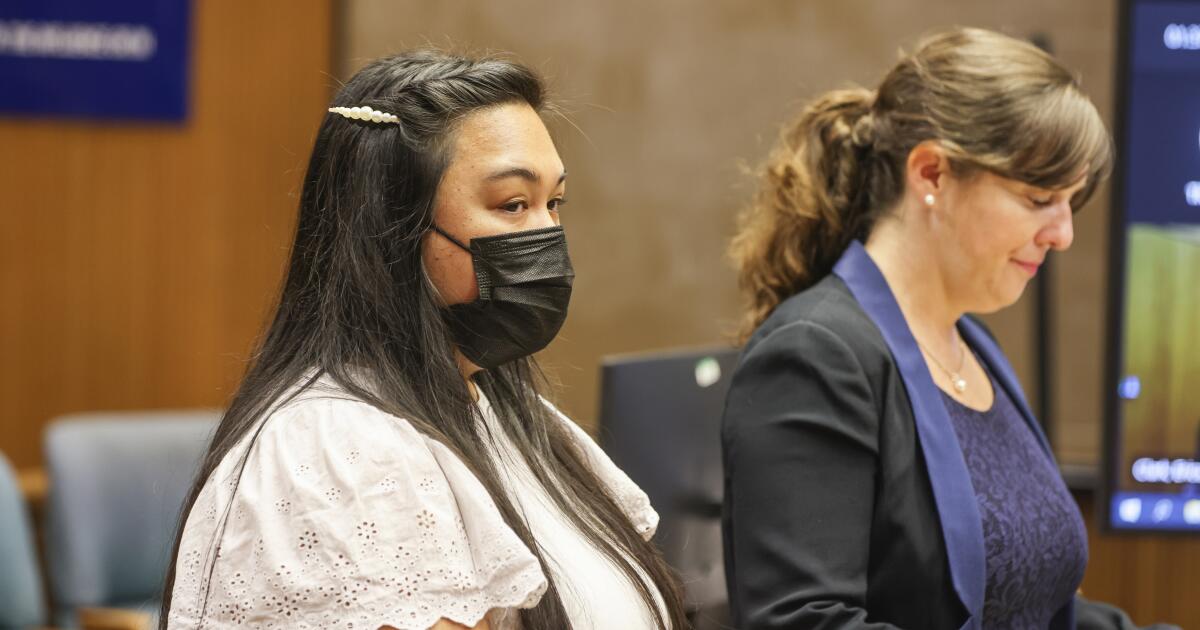
A nurse who left a patient collapsed on the floor of a cell of the woman’s jail in Santee was found not guilty Friday in causing her death, but the same jury was unable to reach a verdict in the case of the doctor who had treated the woman earlier in the day.
Nurse Danalee Pascua and Dr. Friederike Von Lintig were each charged with a sole count of involuntary manslaughter in the death of Elisa Serna, who collapsed and died Nov. 11, 2019, less than a week after she’d been booked into Las Colinas Detention Facility.
An El Cajon Superior Court jury deliberated roughly 2½ days before reaching verdicts in the case, a rare instance of medical professionals being criminally charged in the death of an inmate.
Nine of the jurors voted to acquit Von Lintig, while three voted to convict her. The deadlock forces a mistrial in her case, but prosecutors have the option of trying her case again. Von Lintig is due back in court Wednesday for a status hearing.
Serna, 24, was five-weeks pregnant and suffering from withdrawal of alcohol and narcotics, prosecutors said. Serna reported to the jail staff she had used heroin within two hours of her arrest, but a few days passed before she was started on a withdrawal protocol and put into the medical unit.
While in jail, Serna collapsed several times and had two seizures the day she died. After the second seizure, medical staff summoned Von Lintig, but the doctor did not go to the cell to check on Serna.
Later that day, Serna collapsed inside her cell while Pascua — there to check Serna’s vitals signs — was outside the door. The nurse entered but was unable to take Serna’s vital signs. She and a deputy left while Serna — who had struck her head on a wall when she fell — was still slumped against the wall.
Four minutes later, as seen on security footage from inside the cell, a stream of urine flowed from under Serna. Prosecutors said that’s likely the moment she died. When the nurse returned an hour later, rigor mortis had begun to set in.
A deputy medical examiner with the county testified that Serna died from complications of polysubstance abuse.

Undated photo of Elisa Serna
(Family photo)
During closing arguments Tuesday, Deputy District Attorney John Dunlap said the doctor and the nurse failed to act and failed in their duty to care for Serna.
“This death did not have to happen,” the prosecutor said.
Dunlap also conceded: “There are no heroes in this story. No one came to Elisa’s aid.”
Defense attorneys told the panel during closing arguments that their clients had incomplete information about what happened during the last few days of Serna’s life, and that neither knew the extent of how sick she had been or that she’d had two apparent seizures. Von Lintig was not responsible for treating Serna until the day she died, the attorneys said, and the nurse had been with her only for about four minutes.
Attorneys for both defendants argued that the prosecution failed to meet its burden of proving the defendants’ actions showed reckless indifference to life or criminal negligence — a high bar to prove.
“A mistake is not enough. A lapse in judgment is not enough. Inattention is not enough,” said attorney Alicia Freeze, who represents Pascua.
The defense attorneys put the blame on the Sheriff’s Department, saying the criminal case is a deflection from systemic problems.
“The government has tried to shift the focus of the failures of this jail system onto the shoulders of one individual doctor,” attorney Dana Grimes, who represents Von Lintig, argued to the jury. She said the government threw her client “squarely under the bus.”
The Sheriff’s Department has been skewered in recent years for the high death rates in the seven county jails it runs. A report from the California State Auditor, prompted in part by a 2019 investigation published by the Union-Tribune, found 185 people died in local jails between 2006 and 2020.
Two years ago, 20 people died in San Diego County jails, tied for an all-time high. Last year, the number dropped to 13. Sheriff Kelly Martinez has said the department is taking steps to address concerns, including reforms to medical services.
Serna was unstable throughout her last day. The jury saw security footage of her collapse at the feet of a deputy just outside her cell in the medical unit. The deputy dragged Serna — who appeared to be unresponsive — back inside her cell and left her on the floor. It happened several hours before she died and was not reported in her chart. Von Lintig did not know about the collapse, Grimes said. “It goes to how completely hamstrung (the doctor) was that day.”

Dr. Friederike Von Lintig appears in court at the El Cajon courthouse Oct. 26, 2022 in El Cajon.
(Eduardo Contreras/The San Diego Union-Tribune)
Von Lintig’s attorney said another jail doctor had been treating Serna, and that her client only saw Serna on the last day of Serna’s life. She also noted that Von Lintig’s shift at the jail ended more than two hours before Serna died.
The doctor was told there was a high suspicion that Serna was faking. Grimes said the doctor was presented with “a complicated picture” of what was going on with Serna.
“It was nobody’s impression before Dr. Von Lintig left that day that this was a critically ill patient,” Grimes said.
Freeze said her client, Pascua, followed standard nursing procedures. Freeze said Serna had not been left on the floor in a position that would be considered life-threatening, and that Serna was alert and talking.
“Ms. Serna’s death was not caused by nurse Pascua in the four minutes she saw her,” Freeze said.
Aside from the criminal case, Von Lintig’s and Pascua’s licenses were suspended last year. In addition, the state medical board filed an accusation late last year against the doctor who had been treating Serna in the days before her death. That action is pending.
Serna’s family is also suing the county and others in a civil case in federal court, alleging several causes of action including wrongful death. Trial had been scheduled for February, but that date has been vacated and no new date has been scheduled. The parties have their next hearing slated for March.




